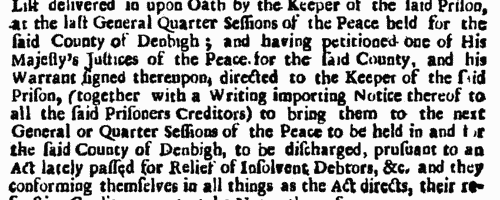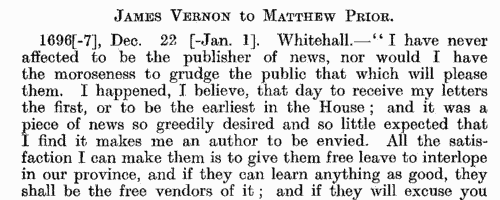Our indexes include entries for the spelling hyde. In the period you have requested, we have the following 1,517 records (displaying 291 to 300):
 Masters and Apprentices
(1717) Masters and Apprentices
(1717)
Apprenticeship indentures and clerks' articles were subject to a 6d or 12d per pound stamp duty: the registers of the payments usually give the master's trade, address, and occupation, and the apprentice's father's name and address, as well as details of the date and length of the apprenticeship. 1 January to 8 November 1717. | Sample scan, click to enlarge

|
 Masters and Apprentices
(1717) Masters and Apprentices
(1717)
Apprenticeship indentures and clerks' articles were subject to a 6d or 12d per pound stamp duty: the registers of the payments usually give the master's trade, address, and occupation, and the apprentice's father's name and address, as well as details of the date and length of the apprenticeship. 4 November to 31 December 1717. | Sample scan, click to enlarge

|
Treasury and Customs Officials, Officers and Pensioners
(1717)
Government accounts, with details of income and expenditure in Britain, America and the colonies
| Sample scan, click to enlarge

|
Treasury Books
(1717)
Records of the Treasury administration in Britain, America and the colonies, for 1717. These also include records of the appointment and replacement of customs officers such as tide waiters and surveyors. | Sample scan, click to enlarge

|
 Masters and Apprentices
(1718) Masters and Apprentices
(1718)
Apprenticeship indentures and clerks' articles were subject to a 6d or 12d per pound stamp duty: the registers of the payments usually give the master's trade, address, and occupation, and the apprentice's father's name and address, as well as details of the date and length of the apprenticeship. | Sample scan, click to enlarge

|
Treasury and Customs Records
(1718)
Government accounts, with details of income and expenditure in Britain, America and the colonies
| Sample scan, click to enlarge

|
 Masters and Apprentices
(1720) Masters and Apprentices
(1720)
Apprenticeship indentures and clerks' articles were subject to a 6d or 12d per pound stamp duty: the registers of the payments usually give the master's trade, address, and occupation, and the apprentice's father's name and address, as well as details of the date and length of the apprenticeship. 1 January to 3 September 1720. | Sample scan, click to enlarge

|
Prisoners for Debt in Worcester
(1720)
Notices by persons imprisoned for debt in Chester, Durham, Exeter, Halton, Lancaster, Oxford, Richmond, Ruthin, Southampton, Whitechapel and Worcester, (5876), 9-12 August 1720, of their intention to apply for discharge, pursuant to the Act for the Relief of Insolvent Debtors. The notices give full name, previous residence, and occupation. | Sample scan, click to enlarge

|
Correspondence of Matthew Prior
(1685-1721)
Matthew Prior was secretary to the British embassy and minister ad interim at The Hague 1693 to 1697, secretary to the embassy at the Congress of Ryswick in 1697, and secretary to the embassy and minister ad interim at Paris 1698 to 1699. His papers survived among the archives of the Marquis of Bath at Longleat, and were edited for the Historical Manuscripts Commission by J. J. Cartwright, A. Maxwell-Lyte and J. M. Rigg, and published in 1909. The volume concludes with a journal and memoirs relating to the Treaty of Ryswick. Most of the correspondence selected deals with the Anglo-Dutch and Anglo-French diplomacy of the period. | Sample scan, click to enlarge

|
 Masters and Apprentices
(1721) Masters and Apprentices
(1721)
Apprenticeship indentures and clerks' articles were subject to a 6d or 12d per pound stamp duty: the registers of the payments usually give the master's trade, address, and occupation, and the apprentice's father's name and address, as well as details of the date and length of the apprenticeship. 2 January to 26 August 1721. | Sample scan, click to enlarge

|
Research your ancestry, family history, genealogy and one-name study by direct access to original records and archives indexed by surname.












